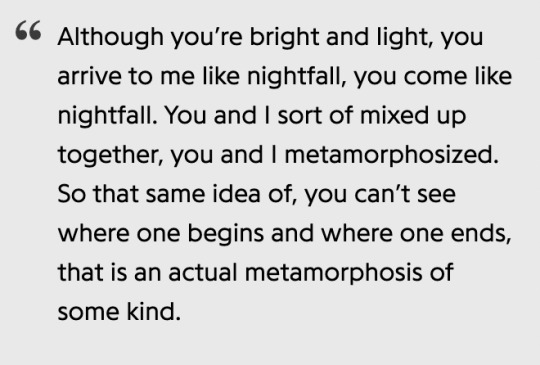#underworld descent
Text
Orphic hero this, corruption arc that.
You know what would be funny? If Childe lives through it all but is none the wiser after the experience.
Still that weird dude who just wants to fight things.
#childe#tartaglia#I hope it doesn't happen#but it would be funny#imagine witnessing the oldest mysteries of teyvat#ancient legends coming to life#abyssal beasts rising from the bottom of the sea#people dissolving into collective consciousness#the world being saved#or doomed#celestia nuking something#etc#and then there's childe#he just wants a duel#he might have gotten corrupted and uncorrupted#and got that beautiful descent into underworld story#and barely survived#he doesn't care#pls fight him#he's bored#maybe the boy really is *that* simple#oh and he found a nice fishing spot recently#wanna join?
58 notes
·
View notes
Text





Descent Into Limbo - Anish Kapoor
“I have always been drawn to a notion of fear, towards a sensation of vertigo, of falling, of being pulled inwards. This is a notion of the sublime which reverses the picture of union with light. This is an inversion, a sort of turning inside-out. This is a vision of darkness. Fear is a darkness of which the eye is uncertain, towards which the hand turns in hope of contact, and in which only the imagination has the possibility of escape.” (source)
#art#installation art#void#hole#black#darkness#circle#sublime#vertigo#fall#descent#limbo#underworld#katabasis#death#portal
7 notes
·
View notes
Text






anyone get it or
#was the fig tree from the prologue intentional. maybe not. did it cause a heart attack when i reread foa. most certainly#not to mention the tone shift in the songs too. and theyre about descent. its too easy LIKE WHATEVER.#like im being realistic about how figs are quite common in ancient greece etc but lord fucking almighty....#plus the patreon snippet of a younger pc and hermes. im going to be sick#<- about to start making some shit up about how they have shared so much with each other their entire lives#traded kindnesses and gifts and confided in the other with their worries . and the other being there is just SO EASY!!!!!#and when hermes offers seph a fruit. like of course they accept#and OF COURSE they try to share it. and like every time they've sat together (on olympus/in the underworld/in the gardens/during a party)#hermes gladly takes it!!!! it's a habit !!!!!!! IT'S AN INSTINCT!!!!! the offer is almost a surprise but hermes shouldn't have been#not really when his hand moves faster than he thinks and he realises he expects that kindness#not in an unkind way or a selfish way. but because he knows seph the way they know him !!! and seph has always been kind!!!!!#and then he realises that he expects /seph/ in his life and suddenly cannot imagine it without them !!!!!!!!!! LIKE CMON#yes this has me by the throat and im ALMOST webweaving but this is mostly about me forcing de selby onto these two#have been fixated on this moment and the sharing and the exchanging since ch8 dropped . hozier is just exacerbating the visions#('sure sunshine. let's share') <- this is not just about that fucking fig#foa
19 notes
·
View notes
Text
Helen: And who did you say you were?
Pen: Penthesilea, Amazon Queen, who went once/ to war to save Queen Helen (that was you)./ "Able to make men mourn" my name signifies, / supreme Amazon speeding to the neediness of Troy,/ leader of twelve good warrior maidens,/ battle-scarred/ and with fierce reputation. We were the last/ hope that queenly Troy could keep intact/ and reachable, the greatest beauty in the world.
Helen: I remember that day./ The sky was a sheet of crystal/ and the wind was still. I ran to see your arrival/ from my windowsill./ You were like Artemis to us, you arrow-carrying bear-dykes./ I could tell Hector/ and the other men had learnt/ some of their skill from you,/ and then too, what can confuse/ a man more than a naked female/ breast with a bloody ax behind it?
Pen: You and I met before the fight./ I rode into the hall/ on the great long-legged stride/ my mother prized me for./ You turned almost at once/ to look me up and down./ My cheeks burned with pride/ though inside/ I felt more like a clown.
Helen: The Amazon were coming!/ To fight on our side!/ We women were electrified./ You looked strange to us/ but exhilarating./ I was especially electrified/ by you.
Pen: I knew it too, that moment/ at least, when our eyes met across the room./ I was your last battle ax/ and you threw it.
Judy Grahn, the Queen of Swords
#very interesting play#about the story of inanna and her descent to ereshkigal in the underworld but also connecting the figure of inanna with amongst other Helen#but set in modern times (well#mid 20th cent.)#Judy Grahn#tagamemnon#classical reception#quotes
9 notes
·
View notes
Text

Christ's Descent into Limbo by Jan Brueghel the Elder and Hans Rottenhammer
#jesus christ#christ#jesus#religious#art#descent#harrowing of hell#hell#underworld#inferno#hades#christian#christianity#religion#jan brueghel the elder#hans rottenhammer#salvation#souls
135 notes
·
View notes
Note
hI. i just sat down to translate the passage where aeneas finds his father again in book 6. what the fuck. WHAT THE FUCK. ive been crying inconsolably for like 20 minutes now. what the fuck man. how do i sue a dead roman poet for emotional damages. is there like, an aeneid support group i can sign up for or sth. what the FUCK !!!
book 6 really is the gift that keeps on giving like it has it all babey! emotional turmoil! ghosts that are neither dead nor alive because they are both the souls of the dead and the souls of those not yet born! awkward encounters with ex girlfriends! truly vergil turning his stylus into a knife and stabbing it directly into my heart!
#not to mention! the fucking book 6/book 12 parallels!#fun to think that in a way both book 6 and book 12 represent aeneas's death#book 6 in the literal way ie descent to underworld + ambiguous return where he may or may not have actually come back at all#and book 12 in the murder-as-suicide if you kill someone who represents you are you really just killing yourself way#but also in the 'death of everything you ever wanted yourself to be' way re: aeneas breaking his father's command#and killing the part of himself that once was merciful#anyway! the aeneid sure is a poem!#aeneidposting
177 notes
·
View notes
Text
Little Red Riding Hood and Alexander the Great: How Little Red Succeeded Where Alexander Failed
tl;dr: Little Red Riding Hood succeeds where Alexander the Great fails because she strays from the path and he, despite others' pleas, does not. LRRH enters and emerges from the Underworld with hard-won knowledge. Alexander wants to do this, but does not.
Note: While I love history, Alexander the Great isn't actually a period or person I've studied. Instead, I'll be relying on the fictionalized epic version of his life, The Alexandreis by Walter of Châtillon, from the 12th century. If you enjoy epics, I highly recommend checking it out.
Note the Second: For the Little Red Riding Hood portions, I'm relying on my own analysis and on the many, many texts I've read about fairy tales and mythology. These are more properly references than works cited, however, and I am not listing them all here (if only because it'll take me a bit to remember them all). I will say that the one book I have referred to is The Trials and Tribulations of Little Red Riding Hood, edited by the incredible Jack Zipes. This book discusses how Little Red Riding Hood has been co-opted to define and control feminine sexuality. (It says a lot more than that and the prologue/epilogues are definitely worth reading! The text is a series of LRRH stories, arranged chronologically).
Little Red Riding Hood
In the earliest stories, the ones before Perrault jotted down his version, Little Red Riding Hood escapes. The wolf tells her to remove all of her clothing piece-by-piece and climb into bed with him. Once there, she realizes the danger, tricks him, and runs away.
After Perrault, though, most versions of the story have Little Red Riding Hood consumed. The wolf swallows her down. In Perrault that was the end. She died. Later versions, though, notably the Grimm version, have her saved, usually by a man.
I will make references to multiple versions, but all will hit the following beats: Little Red Riding Hood has a cap or cape of red or gold, is sent by her mother to bring food to her grandmother in the woods, meets the wolf, is delayed or chooses the longer route, finds the wolf in her grandmother's place, realizes the danger too late, is eaten, and is saved.
This is not the "right" or "true" version of the story. These are just the most common beats, I believe, and the ones most people would hit if asked to tell the story from memory.
My other important caveat about how I treat this story is that the comparisons and analyses I make are not meant to suggest fundamental truths or "real meanings" of the story. As Zipes points out, comparisons to ancient beliefs and rituals are possible, but the recognizable story is too recent for them to be the actual origins. (On a side note, do read Tehrani).
Little Red Riding Hood is a highly sexualized story. I want to focus on how that sexualization occurs. In the story, Little Red is on the cusp of maturity. Some even argue that her red cape is a symbol of menstrual blood. She is in-between woman and child and she goes into the woods.
The woods, in fairy tales, is a place where protagonists meet monsters and magic. It is the realm of the unknown where demons lurk, witches practice, and transformation takes hold. The woods is where characters lose and find themselves. No one can travel in without exiting changed.
Little Red, still innocent as a child, but now realizing that there is something she doesn't know, goes into the realm of the unknown and meets a monster. Some interpretations portray Little Red's interactions as a seduction, even a mutual seduction, and, eventually, a sexual encounter or rape. In the interpretations I like the least (but that are horribly well supported, as Zipes also points out), Little Red flirts with the wolf and pays for this promiscuity by being eaten, which can be a euphemism for rape.
While in the woods, Little Red either strays from the path to gather flowers or takes a longer path (either pins or needles; these paths also deliberately suggest ignorance and knowledge). This allows the wolf to reach her grandmother first. The important takeaway is that Little Red does not take the most direct path through the woods. She dallies. She strays. She explores.
Little Red Riding Hood moves off the path and goes into the woods. She is given the choice between the safe path and the winding one, the safe path and the field of flowers. Little Red Riding Hood has a choice. She can cling to ignorance and remain safe or she can abandon safety and seek knowledge and new experiences.
The woods are full of both beautiful (flowers) and terrible (wolves) things.
Her explorations also give the wolf time and therefore create the circumstances in which she descends to the underworld.
At its most basic, a descent into the underworld is dying. Most 'descents' imply an 'ascent' of some sort, though. Little Red ascends when she emerges from the wolf's belly. This experience changes her. In some versions of the story, this change is signified by her and her grandmother killing a second wolf or by her grandmother turning the pelt of the first wolf into a new cape for Little Red. No longer does she wear the mark of her innocence; she wears her hard-won knowledge and experience.
Little Red Riding Hood is the story of innocence and experience, of death and renewal, of dying and coming back to life changed and burdened with new knowledge.
Another way to interpret Little Red Riding Hood is as a solar myth. Little Red is the sun who is consumed by winter and restored, somewhat violently, as spring. The interesting connection is that some solar myths are also concerned with known and unknown. Little Red begins as innocence--the young hero, youthful king--untried and eager. Then she passes into the unknown where she is killed. This is the descent into the underworld. It is happens in stages--entering the woods, entering the cabin, confronting her death, dying. This is also her descent into knowledge. She knows what it means to die now. Then, when the woodcutter comes and cuts her free, she is rebirthed. She is spring come again, but she is not the same girl she was. She knows death now. She will never be the same.
Sondheim captures all of this quite well in Into the Woods when Little Red sings, "I Know Things Now." She describes her consumption as, "And he swallowed me down / Down a dark, slimy path / Where lie secrets that I never want to know." And the aftermath as, "And I know things now / Many valuable things / That I hadn't known before."
Little Red engaged with the unknown--she talked with the wolf, she strayed from the path or took a longer route, was eaten--and emerged new, different, and wise in ways she wasn't before. She moved from innocence and ignorance into knowledge and experience.
Alexander the Great
In the Alexandreis, Alexander the Great is a great, terrible, and insatiable conqueror. Late in the epic, a goddess warns the gods of Alexander with the following lines:
And if the Fates
should lend his sails kind winds, he plans to seek
the Nile's source, and lay siege to Paradise.
Look to yourself, or else he'll not permit
the hidden reaches of the Antipodes
or deep Chaos itself, to go unscathed,
but strive to gaze upon the other sun.
This is not an exaggeration. Throughout the epic, Alexander always sets his sights on more and talks about giving out judgements alongside Jove and sharing knowledge of the world beyond with his men. He constantly seeks out challenges "worthy" of him.
When faced with Porus, Alexander exclaims,
"Here, at last,
is danger worthy of amazement, and
my spirit's math. One deed I must achieve
against both monsters and illustrious men."
Alexander measures himself by glory won, but he isn't only chasing glory. He continuously seeks out the new. He wants new challenges and lands. He wants to uncover the mysteries and, like a new Prometheus, share them out.
The Nile's source was, at the time of the story, one of the great mysteries. Some thought the source of the Nile was in the realm of the gods. The Nile was fed by the gods or flew up into the heavens. The source was both unknown and not something to be known. To some, the Nile itself was like a god and searching out the source was to deliberately intrude on the heavenly realm.
The Antipodes refers to the opposite side of the world, a land of reversal. It, also, was seen as beyond humanity's capacity to find or explore. Additionally, people weren't supposed to go there because of its relation to the divine.
The "other sun" refers to the lands of the afterlife.
Alexander wants to hunt down and discover the great, all-but-forbidden mysteries of the world and lay them bare for all to know. He wants to try himself against new challenges to prove his mastery of the world.
He goes about this the only way he knows how: beating everyone else up. Every victory increases his hunger for another victory.
Repeatedly people warn him to stop or to just pause, but he refuses. He's told that he'll make a good corpse for scavengers. He's warned that loss is one day inevitable and so he should prepare. He's begged to slow down, if not for himself, then for the men following him.
Alexander always refuses. To the last he says,
"Not to provoke the ill will of the gods,
the world's too narrow, the breadth of the earth
is insufficient for its only lord.
But when I've passed beyond this conquered universe,
I'll undertake to open to my followers
another world. The strong man finds no goal
insuperable. I hasten now to penetrate
the shores of the Antipodes, and view
the other Nature. Though you begrudge your arms,
I cannot fail in duty to myself.
I'll think the entire world my theater,
and move my troops throughout its length, ennobling
ignoble lands and peoples by my wars."
Later, near his death, he says, "The ancients teach us that more worlds exist; / alas, that I have yet to vanquish one!"
For Alexander, knowing is mastering through war. He cannot explore a new land; he must conquer it.
He has one path through life and, despite multiple people both friend and foe urging him to try something, anything else, he never strays. Then he is poisoned and, though he boasts about being called to Olympus to reign, he dies and that is all of his story.
How and Why Little Red Riding Hood Succeeded where Alexander the Great Failed
Alexander wanted the unknown. He sought it out relentlessly throughout his life. The problem is that he never took the time to explore, to talk with wolves, to gather flowers, or to take the longer route. He had one path through life--victory in war--and stayed firmly upon it. He refused all requests to change. Alexander could have marched right through the afterlife and emerged unsatisfied and knowing nothing new. He could slay Cerberus and not learn a single thing because he didn't take time. He never reflected except on his desires for more glory and the insufficiency of the world to provide challenges. No one can descend into the underworld if they are unwilling to be changed. The descent requires change.
In Inanna and one version of Little Red Riding Hood, the heroine sheds (and destroys) her clothing piece by piece before dying. She is humbled and pared down to her core self before, eventually, being saved. No one can go into the realm of death without losing something and becoming something new. Alexander, though, would never part with any symbol of his glory.
Alexander wanted to know every mystery of the world, but failed to learn them because he never strayed from his path of conquest. He took the shortest and most direct route through the unknown and then despaired over not meeting monsters worth his mettle. But monsters don't lurk on the path. They're in the shadows.
And so Alexander never gains the secret knowledge he chased--the same secret knowledge Little Red so unwillingly gained. He remains forever the youthful king, while Little Red dons the gray pelt of the wolf and returns home from the woods with secrets and knowledge, both unwanted and valuable. In other words, despite his best efforts, Alexander remains forever in ignorance because he never humbled himself or tried another method for exploring and learning about the mysteries of the world. In contrast, Little Red explores and engages with the unknown and so passes from ignorance into knowledge.
#fairy tales#little red riding hood#alexander the great#lunchtime ramble#lrrh#meta#descent into the underworld
16 notes
·
View notes
Text

The Descent, one of the most under-rated horror movies. The beauty of this type of movie is that It's believable, and that's what makes it really scary. Bonus scare points for those like myself who are a bit claustrophobic.

2 notes
·
View notes
Video
Ereshkigal: The Mesopotamian Goddess of the Land of the Dead!
#youtube#Ereshkigal#Mesopotamian goddess#Irkalla#Underworld#Land of the dead#Mythology#ruler#Descent of Inanna#inanna#Afterlife#Funerary rituals#Worship#ancient mesopotamia#divine intervention#Sacrifices
2 notes
·
View notes
Text
word association games are great because you go from burn to baby to burn then you find yourself going from future to back to bitches and money to maker to ass and then later on you find yourself going from jail to Santa and all of this is at the speed of light and that’s family
#quil's unholy underworld#shitpost#word association#word association games#other highlights include the several descents into murder#the time my dad said torgue and I immediately said BLOW UP THE FUCKING OCEAN#and my sister quoting vines#i was the jail to Santa one btw okay it makes perfect sense#….if you have the exact right context
15 notes
·
View notes
Text
hannibal “allergic to city walls as a concept” barca in punica book 12 like i’m #ADPORTAS. on all levels of except the physical i am Inside Your Walls. i’m using the power of Sight to Eat Your City. if jupiter optimus maximus is so powerful why does he not kill me with a lightning bolt literally here and now. and it’s so sexy of him
#like the punica is Inconsistently Good (it is often Bad) but silius italicus ALWAYS delivers with. fucked up cities <3#anyway i have reached book 13 which j.d. duff promises has a katabasis and many ghosts in it. the hype is enormous#like yes scipio africanus descent into the underworld you’re so sexy and herculescoded aha#punica#hannibabe#beeps
18 notes
·
View notes
Text
tired: syncretizing jesus with attis and adonis
wired: syncretizing jesus with persephone and inanna
#something something harrowing of hell something something descent into the underworld#paganism#christianity#spirituality#dubious scholarship with annie#stuff and nonsense#babbles
2 notes
·
View notes
Text
Ok, so I am attempting to be productive today by working on my wip guide and. I’ve stumbled across an issue? Potential issue?
Y’all know how masks and trust is a like. Series/umbrella tag for all things Celeste/Vega at and following their meeting? That. Implies that the individual things (the coffee shop talk, for example) should have their own intros, yeah? Like how ‘ocean fable’ is used across Ocean’s Heart, LAWLB and Maidens and Monsters. So… I should work on the individual intros, right?
(I’ve also just noticed that the TDWAD people don’t have character intros, so that’s another problem fhjkl)
#i ramble in the tags#I should maybe know how to run a writeblr but unfortunately for all of us I do not#organization is a new thing I’m doing for all of your guy’s benefit. so put in your say. please#I’ve never been organized a day in my life#idk what I’m doing#also we’re ignoring that Davy Jones doesn’t have an intro either#I’m working on that too#and… debating what smaller wips I want to put intros up for#one I know of#and I’m debating doing one for Her Name is Kore (an identity-focused take on Persephone’s underworld descent)#thoughts?#pretty please?
8 notes
·
View notes
Text
Just sat down and wrote over 8k all at once which a) I have not done since 2012 and b) means I skipped both lunch and dinner by accident
#but not on any projects I wanted to work on#No I had to start some new bullshit#it’s about the mythologies of it all#i am not immune to inanna’s descent into the underworld#op
19 notes
·
View notes
Text
Happy Autumn Equinox!!!
0 notes
Text

0 notes